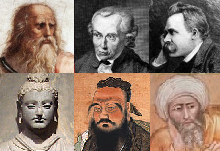Philosophy
|
| This article is about Philosophy is part of part of a series on Philosophy articles |
|---|
You, the reader, should recognize that the sheer brevity of this article would indicate that it is designed to be a seed for commentary and discussion. Tens of thousands of pages have been written about Philosophy by thousands of scholars. It has been the topic of thousands of doctoral thesis's and I do not wish to enter into any form of debate with anyone. Read what it is presented and debate its' merits with someone else. |
| ~ Robin Roberts |
Philosophy is the study of general and fundamental problems, such as those connected with existence (ontology), knowledge (Epistemology), values, reason, mind, and language. Philosophy is distinguished from other ways of addressing such problems by its critical, generally systematic approach and its reliance on reason|rational argument (reason). "Philosophy is rationally critical thinking, of a more or less systematic kind about the general nature of the world (metaphysics or theory of existence), the justification of belief (epistemology or theory of knowledge), and the conduct of life (ethics or theory of value). Each of the three elements in this list has a non-philosophical counterpart, from which it is distinguished by its explicitly rational and critical way of proceeding and by its systematic nature. Everyone has some general conception of the nature of the world in which they live and of their place in it. Metaphysics replaces the unargued assumptions embodied in such a conception with a rational and organized body of beliefs about the world as a whole. Everyone has occasion to doubt and question beliefs, their own or those of others, with more or less success and without any theory of what they are doing. Epistemology seeks by argument to make explicit the rules of correct belief formation. Everyone governs their conduct by directing it to desired or valued ends. Ethics, or moral philosophy, in its most inclusive sense, seeks to articulate, in rationally systematic form, the rules or principles involved." The word "philosophy" comes from the Greek φιλοσοφία (philosophia), which literally means "love of wisdom".
The definition of philosophy is:
- 1.orig., love of, or the search for, wisdom or knowledge
- 2.theory or logical analysis of the principles underlying conduct, thought, knowledge, and the nature of the universe.
Etymology
The introduction of the terms "philosopher" and "philosophy" has been ascribed to the Greek thinker Pythagoras. The ascription is said to be based on a passage in a lost work of Herakleides Pontikos, a disciple of Aristotle. It is considered to be part of the widespread body of legends of Pythagoras of this time. "Philosopher" was understood as a word which contrasted with "sophist" (from sophoi). Traveling sophists or "wise men" were important in Classical Greece, often earning money as teachers, whereas philosophers are "lovers of wisdom" and not professionals.
- More information is available at [ Wikipedia:Philosophy ]
| W. Parrot Model of Emotions | ||
|---|---|---|
| Primary emotions | Secondary emotions | Tertiary emotions |
| Love | ||
| Affection | adoration, affection, attraction, caring, compassion, fondness, liking, love, romance, sentimentality, tenderness, | |
| Lust | arousal, desire, ecstasy, lust, passion, infatuation | |
| Longing | longing | |
| Joy | ||
| Contentment | Contentment, pleasure, happiness | |
| Enthrallment | enthronement, rapture | |
| Pride | pride, triumph | |
| Optimism | eagerness, hope, optimism | |
| Relief | relief | |
| Zest | enthusiasm, zeal, less, excitement, thrill, exhilarating | |
| Surprise | ||
| Surprise | amazement, surprise, astonishment | |
| Anger | ||
| Irritation | aggravation, irritation, education, annoyance, grouchiness, grumpiness | |
| Exasperation | exasperating, frustration | |
| Disgust | disgust, revulsion, contempt | |
| Rage | anger, rage, outrage, fury, rat, hostility, ferocity, hate, loathing, scorn, Spike, faithfulness, dislike, presentment | |
| Envy | envy, jealousy | |
| Torment | torment | |
| Sadness | ||
| Disappointment | dismay, disappointment, displeasure | |
| Neglect | alienation, isolation, neglect, loneliness, rejection, home sickness, defeat, detection, insecurity, embarrassment, humiliation, insult | |
| Sadness | depression, despair, hopelessness, gloom, loneliness, sadness unhappiness, grief, sorrow, woe, Missouri, melancholy | |
| Shame | guilt, shame, regret, remorse | |
| Suffering | agony, suffering, hurt, malaise | |
| Sympathy | pity, sympathy | |
| Fear | ||
| Horror | alarm, shock, fear, fright, or Caarol, panic, hysteria, mortification | |
| Nervousness | apprehension, anxiety, distressed, dread nervousness, phobia, tenseness, uneassiness, tremor, worry, distressed, dread | |
Chat rooms • What links here • Copyright info • Contact information • Category:Root
